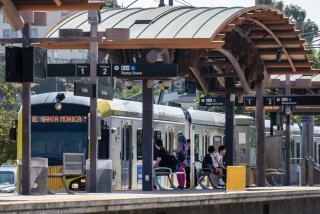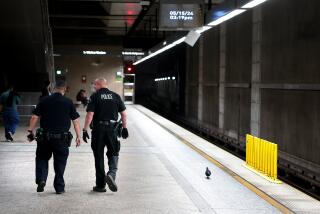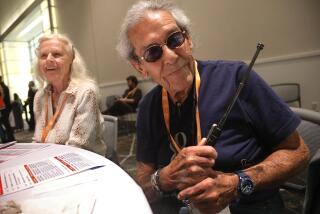Commuter Students Up to Speed on Learning : Jokes aside, 12 Boston suburbanites ponder ‘Principles of Management’ on way to work.
FRANKLIN, Mass. — The jokes and the puns were probably inevitable. “Choo-Choo U,” this rapid-transit approach to education was immediately dubbed. Students, lurching while the 7:45 a.m. train pulls out of this suburban station an hour south of Boston, were said to be “on the fast track.” The Massachusetts Bay Transportation Authority just couldn’t resist touting its new “commuter classroom” as “an alternate route” to learning.
But if you ask the 12 adults who have signed up for the three-credit undergraduate course offered jointly by Dean College and the MBTA, the proof is in the principles--in this case, “Principles of Management,” the subject they are studying three mornings each week.
“I’d wanted to go back to college for a long time,” said Kathy Harber, a 44-year-old legal assistant at a large Boston law firm. “I’d used every excuse in the world to avoid doing anything about it.” When it turned out Harber could use her commute time as college time, “that was what finally got me off my duff.”
At the Boston leasing company where she is a senior secretary, Avia Johnston, 43, said executives had urged her for some time to sign up for college courses. But the prospect of navigating a university bureaucracy was too intimidating for Johnston, a grandmother of two whose formal education stopped with high school.
“This was the incentive I needed,” she said. “It’s social, you get to meet people, it’s small and it’s stimulating.”
The idea of turning the commuter rails into college classrooms was the brainchild of Joy Evans, director of continuing education at Dean College, a small two-year institution in this community southeast of Boston. Evans learned that a similar effort had been conducted between 1971 and 1986 by Adelphi University on New York’s Long Island.
In the ‘90s, Evans reasoned, a commuter classroom made more sense than ever. Colleges have satellite campuses in shopping malls, after all. Trains offer a captive audience. And time is a precious premium that no working American can afford to overlook.
“Obviously, this program appeals to people who are trying to get that little edge by using their time more wisely,” said John Haley Jr., general manager of the MBTA.
To Robert Anzenberger, a Northeastern University professor and longtime train commuter who is teaching this first course for Choo-Choo U, the appeal of a commuter classroom is as clear as the old equation that dictates that time is money.
“You’ve seen all those bumper stickers--’It’s the economy, stupid,’ ” Anzenberger said. “Well, we’re so deep into a recession that it’s very difficult for people working in corporations to get to traditional classes.”
While market research and a survey of train commuters showed substantial interest, only 12 pioneers actually ponied up the $330-tuition fee and agreed to devote their morning commutes to the pursuit of higher learning. Still, MBTA and Dean College officials say the students make up in enthusiasm what they lack in numbers, and two more courses are under discussion for the next school term.
Anzenberger said the eagerness and discipline of his commuter-students has come as a surprise.
“I’ve been pleased to find out how motivated and how extremely bright they are,” Anzenberger said. “I didn’t expect people in an undergraduate course to exceed the people in my MBA program.”
Another unexpected aspect of teaching on a train turns out to be learning to accept the state of constant motion, Anzenberger said. His 65-ton classroom travels at 60 m.p.h., snaking through the suburbs as he uses his collar microphone to shout out something about “the Wall Street solution.”
“You really have to keep your two feet planted,” he said. “You literally have to start thinking in terms of art and choreography.”
Students say another hidden benefit is that the class provides a new kind of camaraderie. Their out-of-classroom work for “Principles of Management” means they are often in contact during the day. And when they board the train at night, they tend to sit together and talk about their schoolwork.
“That really is one of the big rewards,” Anzenberger said. “You’re not staring at the back of someone’s head for decades at a time.”
Of course, taking on a college business course three mornings each week also means giving up the time that is usually reserved for newspapers, magazines and pulp fiction.
Anzenberger’s only male student, 35-year-old electrical engineer Michael Sullivan, held up his “Contemporary Management” textbook and quipped that “instead of reading the papers, now I’m reading something useful.”
Jean Cataldo, a receptionist in a Boston law firm, said she was thrilled to find a reason to use her brain on her morning commute. As for her paperback novels, Cataldo, 55, said with a smile: “There’s still the trip home.”
More to Read
Sign up for Essential California
The most important California stories and recommendations in your inbox every morning.
You may occasionally receive promotional content from the Los Angeles Times.










